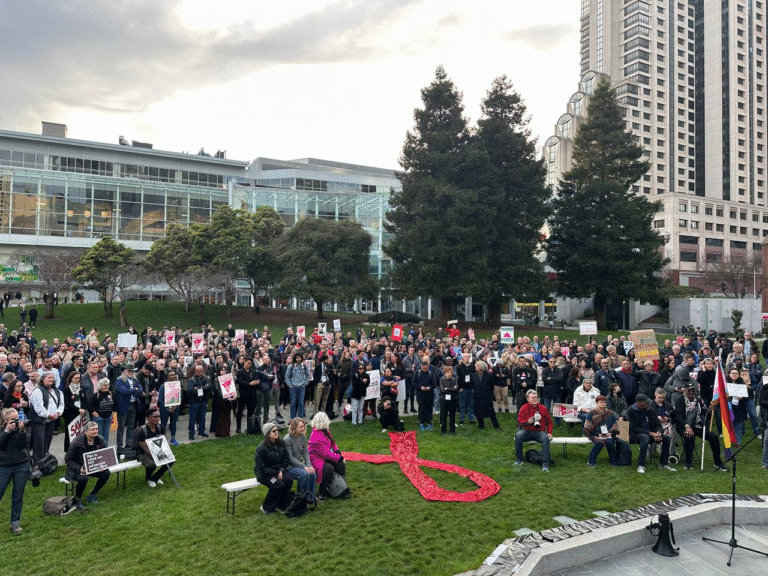Rally for HIV Research in San Francisco: Call to Action Against Funding Cuts
San Francisco witnessed a large gathering at Yerba Buena Gardens on March 10, 2025, where numerous stakeholders convened for the “Save Our Sciences: Rally for HIV Research.” The event aimed to advocate for essential funding to support ongoing HIV research initiatives, which are currently threatened by proposed budget cuts from the federal government.
Organizers and Purpose
The rally was organized by the San Francisco AIDS Foundation’s HIV Advocacy Network alongside scientists attending the Conference on Retroviruses and Opportunistic Infections (CROI). Attendees included researchers, healthcare professionals, and advocates, all united in expressing their concerns over the potential loss of federal support.
Powerful Voices
Lauren Thomas from the San Francisco AIDS Foundation welcomed the crowd with enthusiasm, introducing Vince Crisostomo, a long-time HIV activist whose personal journey has profoundly shaped his advocacy.
“Last month, I turned 64,” Crisostomo shared. “Science saved my life. We cannot let them take that away from future generations.”
His statement served not only as a celebration of advancements in HIV treatment but also as a stark warning that regression in funding could reverse the progress made over the years.
Funding Threats
The rally sought to address proposed federal budget cuts that could severely impact organizations vital to HIV research, including the National Institutes of Health (NIH), the Centers for Disease Control and Prevention (CDC), and the President’s Emergency Plan for AIDS Relief (PEPFAR).
Dr. Tyler TerMeer, CEO of the San Francisco AIDS Foundation, emphasized the urgent need to prioritize scientific progress.
“If we let politics take priority over science, we risk losing decades of progress,” he stated. “We are standing up not just for research, but for the people whose lives depend on it.”
Broader Implications of HIV Research
Speakers argued that the consequences of cutting HIV research funding extend beyond the virus itself. For instance, breakthroughs in HIV treatment have spurred advancements in various medical fields, such as cancer therapy and the rapid development of COVID-19 vaccines. Dr. Steve Deeks from UCSF noted:
“The COVID-19 vaccine was made possible by HIV researchers. Treatments for hepatitis C and tuberculosis? Also thanks to HIV research. Cutting funding now would hurt medical progress for everyone.”
Moreover, Dr. Beatriz Grinsztejn, president of the International AIDS Society, warned about the global ramifications, emphasizing that cuts could lead to a resurgence of the epidemic among vulnerable populations lacking access to life-saving treatments.
A Personal Impact
Naina Khanna, director of the Positive Women’s Network-USA, illustrated how marginalized communities would bear the brunt of these cuts.
“This isn’t just about science—it’s about justice. These cuts are a death sentence for Black and brown people, for trans people, for those already pushed to the margins.”
Call to Action
The atmosphere at the rally was charged with determination, with participants chanting slogans reminiscent of early HIV/AIDS activism, such as “Act up! Fight back!” Dr. Franco Chevalier, an infectious disease specialist, concluded with a rallying message of resilience:
“We are not just researchers. We are fighters. We are not going anywhere.”
As the event drew to a close, many attendees committed to continuing their advocacy efforts, urging lawmakers to safeguard funding for HIV research initiatives.
Organizers encouraged those unable to attend to reach out to their congressional representatives to demand action and support for HIV research.
“Science saves lives,” TerMeer reminded the crowd. “We’re not letting anyone take that away.”



